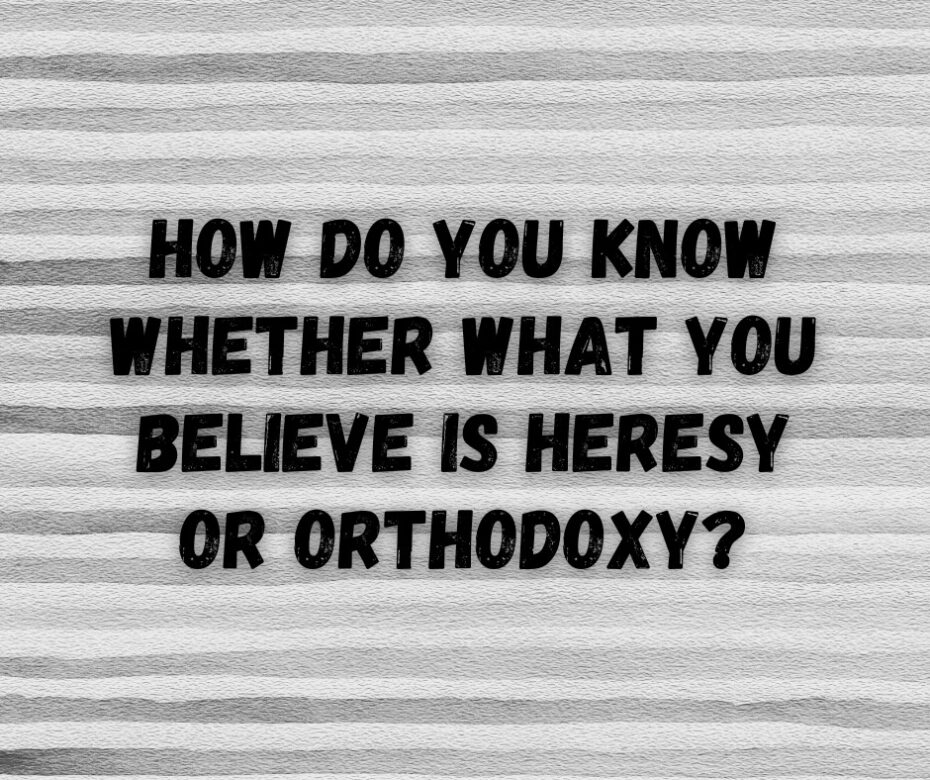The word heresy refers to any teaching that is contrary to the official teaching of the church. So it would seem a simple matter to identify heretical teaching. Just compare all teachings to the official standard.
But therein lies the problem with identifying heretical teaching.
Which church’s official dogma is to be held up as binding for all Christians today?
The early church? The church of the Middle Ages? The Reformed church? The Lutheran church? The Southern Baptist Convention? The Methodist church? The Evangelical Free church? The Church of the Nazarene? The Assembly of God? The Church of Christ?
Did you know that there are hundreds of denominations in the world today? There are over 25 different denominations within Anglicanism, over 35 different Baptist denominations, over 20 Pentecostal denominations, over 20 Methodist denominations, and so forth (see this Wikipedia article for a fairly complete listing).
What is heretical for a Hard-Shell Baptist, also known as a Primitive Baptist (not even listed in the Wikipedia article), may be orthodox for a Southern Baptist. What is heresy according to the Presbyterian Church in America is different from what is heresy for the Presbyterian Church USA. The 35 million people in various Non-Trinitarian Restorationist denominations have completely different standards of orthodoxy from other denominations.
Got Questions dot org points out: “Obviously, the gauge for ‘heretical’ teaching varies according to the established orthodoxy of the day. Any group or individual who differs from another group can technically be called heretical” (see here).
You can––and likely will––be called a heretic if you say that one is eternally secure solely by faith in Christ for the gift of God, everlasting life (John 4:10-14), apart from perseverance in faith and good works. Most Evangelicals today do not believe in eternal security. And among those who say they do, most believe that only those who persevere in faith and good works will gain what they call final salvation, and only when they gain that salvation will they become eternally secure.
Biblical heresy is any teaching that contradicts the clear teaching of the Word of God. Typically, churches do not apply this to non-essential issues like whether women should wear head coverings when they pray, whether tithing is a command for today, or whether Christ will rapture the church before, during, or after the Tribulation.
Many people in Christendom today are taught a series of doctrines that they accept without any personal study of the Word of God. Many people are comfortable with this approach. A person might say, “I’m a Lutheran and my family have been Lutherans as far back as we can trace.” Of course, that means that one’s beliefs are only as accurate as the denomination one is in.
The biggest problem here concerns the issue of what one must do to be saved from eternal condemnation. If your denomination teaches a view that is heretical–that is, a view that is contrary to the Word of God–then you’re in good standing with your denomination concerning your view of salvation, but not in good standing with God. You will be without everlasting life even though your denomination says you’re on the path that will lead to everlasting life if you persevere (cf. Matt 7:21-23; Acts 15:1; Gal 1:6-9; 2:16). Doctrine matters.
You cannot pass off the responsibility to study the Word of God for yourself. Of course, it is vitally important that you attend a solid Bible-teaching church (Heb 10:23-25). But that requires great care on your part to find such a church in the first place. There are thousands of choices. And once you do find a good Bible-teaching church, you still must be a Berean in terms of evaluating what you hear there (Acts 17:11).
If you believe in the Lord Jesus for everlasting life, then you will be judged by Him at the Judgment Seat of Christ (2 Cor 5:9-10). When He judges you, He will judge you based on the Word of God, not the word of your denomination. So let’s all be Berean believers who search the Scriptures for ourselves to confirm that what we have been taught is true.
Heresy is not in the eye of the beholder. Heresy is in the eyes of God. Any teaching that is contrary to the Word of God is heresy. Let’s be people of the Book since it is the Word of God!


